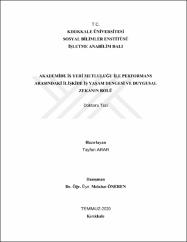| dc.contributor.advisor | Öneren, Melahat | |
| dc.contributor.author | Arar, Tayfun | |
| dc.date.accessioned | 2021-01-16T19:03:46Z | |
| dc.date.available | 2021-01-16T19:03:46Z | |
| dc.date.issued | 2020 | |
| dc.identifier.uri | | |
| dc.identifier.uri | https://hdl.handle.net/20.500.12587/15761 | |
| dc.description | YÖK Tez ID: 642606 | en_US |
| dc.description.abstract | Bu çalışma, literatürde farklı sektörlerde kabul görmüş olan "mutlu çalışan = üretken çalışan" tezinin akademideki geçerliliğini saptamak amacıyla yapılmıştır. Bu çerçevede öncelikle uluslararası literatürde son yıllarda önemi kavranan fakat ulusal literatürde çok az çalışılmış olan iş yeri mutluluğu kavramının akademik ortamda değerlendirilerek algılanan akademik performansa olan etkisi incelenmiştir. Buradaki sorunsal; akademisyenlerin sergilemiş oldukları performansın sadece iş yeri sınırlarında kalmayarak özel yaşamlarında da devam etmesidir. Bu yüzden iş yerindeki mutluluğun, iş yeri dışında da sergilenen performans üzerindeki etkisinin araştırılmaya değer nitelikte olduğu düşünülmektedir. Bununla birlikte bu ilişkide öncelikle bir akademisyenin olmazsa olmazı diye nitelendirilebilecek duygusal zekaya sahip olmasının, ilişkideki düzenleyicilik etkisini incelemek amaçlanmıştır. Ayrıca akademisyenlerin iş yerinde mutlu olduklarında, işlerine daha fazla zaman ayıracağı düşüncesi ile iş yaşam dengelerini kuramadıkları için en azından algılanan akademik performanslarının da yükseleceği öngörülmektedir. Bu kapsamda ilk kez 2016 yılında uygulanan Akademik Teşvik Sistemi'nin sonuçlarına göre ülkemizde en yüksek ortalamayı İç Anadolu Bölgesi'ndeki akademisyenlerin alması sebebiyle bölgedeki 1136 akademisyen ile çalışma gerçekleştirilmiştir. Sonuçlar iş yeri mutluluğunun, algılanan akademik performansı pozitif yönde anlamlı olarak etkilediğini göstermiştir. Duygusal zekası yüksek olan akademisyenlerin iş yerinde mutlu olduklarında algılanan akademik performans düzeylerinin en üst noktaya çıktığı belirlenmiştir. İş yaşam dengesinin boyutları olan yaşamı ihmal etme ile yaşamın işten ibaret olması, bu ilişkide kısmi aracılık görevi üstlenmiştir. Bununla birlikte çalışma kapsamındaki değişkenlerin, katılımcıların demografik niteliklerine göre kısmen farklılaştığı tespit edilmiştir. | en_US |
| dc.description.abstract | This study was carried out to determine whether the "happy employee = productive employee" thesis, which is generally accepted in different sectors in the literature, is also valid in the academy. In this context, the effect of workplace happiness, whose importance has been recently realized in international literature and studied very little in national literature, on perceived academic performance was examined. The issue here is that the performance of academics continues not only within the boundaries of the workplace but also in their private lives. Therefore, the effect of happiness in the workplace on the performance exhibited outside the workplace is considered to be worth investigating. Moreover, in this relationship, it is primarily aimed to examine the moderation effect of emotional intelligence. In addition, it is predicted that at least perceived academic performance will increase, since academics are unable to establish work-life balance with the thought that they will spend more time on their jobs when they are happy in the workplace. In this context, according to the results of the Academic Incentive System, which was implemented for the first time in 2016, studies were conducted with 1136 academics in Central Anatolia region due to being a region as having the highest average score the country. Results show that workplace happiness positively affected perceived academic performance. It was also determined that the perceived academic performance levels of academicians with high emotional intelligence when they were happy at the workplace peaked. Moreover, neglecting life and life's consisting of work which are the sub-dimensions of work life balance have served as partial mediators in this relationship. In addition, it was determined that the variables differed slightly according to the demographic features. | en_US |
| dc.language.iso | tur | en_US |
| dc.publisher | Kırıkkale Üniversitesi | en_US |
| dc.rights | info:eu-repo/semantics/openAccess | en_US |
| dc.subject | İşletme | en_US |
| dc.subject | Business Administration | en_US |
| dc.subject | | en_US |
| dc.subject | | en_US |
| dc.subject | | en_US |
| dc.subject | | en_US |
| dc.subject | | en_US |
| dc.subject | | en_US |
| dc.subject | | en_US |
| dc.subject | | en_US |
| dc.subject | | en_US |
| dc.subject | | en_US |
| dc.subject | | en_US |
| dc.title | Akademide iş yeri mutluluğu ile performans arasındaki ilişkide iş yaşam dengesi ve duygusal zekanın rolü | en_US |
| dc.title.alternative | The role of work-life balance and emotional intelligence in the relationship between workplace happiness and perforamnce in academy | en_US |
| dc.type | doctoralThesis | en_US |
| dc.contributor.department | KKÜ, Sosyal Bilimler Enstitüsü, İşletme Anabilim Dalı | en_US |
| dc.identifier.startpage | 1 | en_US |
| dc.identifier.endpage | 345 | en_US |
| dc.relation.publicationcategory | Tez | en_US |
















